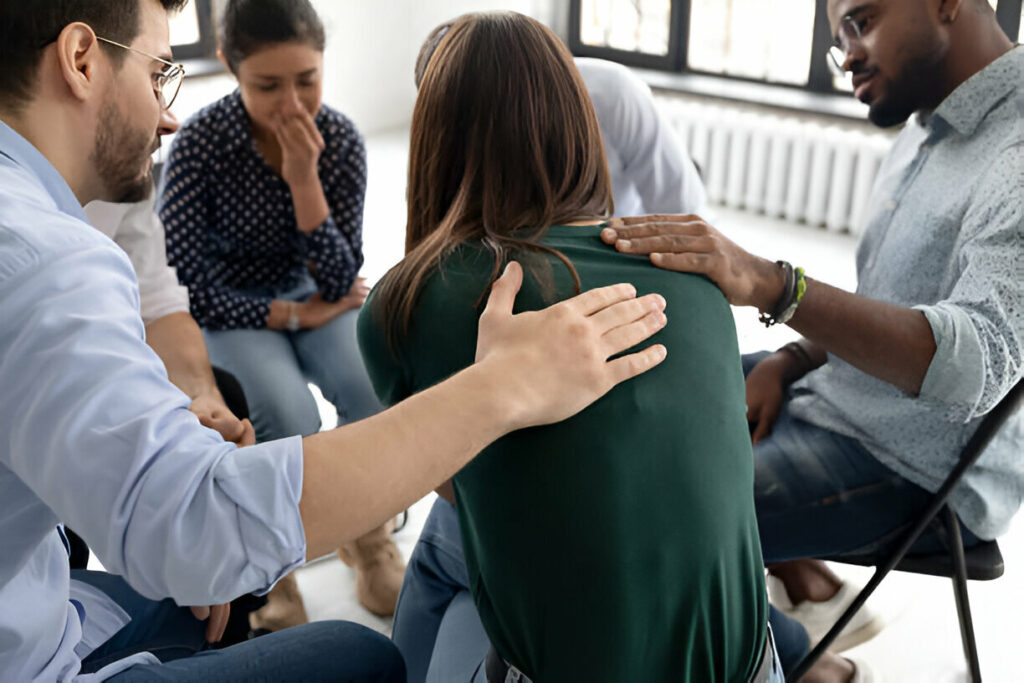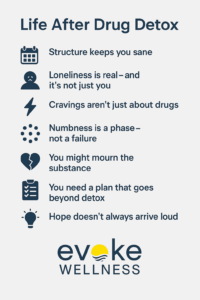You’ve made it through drug detox. Maybe you thought that part would be the hardest. Maybe it was.
But now it’s quiet. And somehow, that’s worse.
You don’t want to go back to using. Not really. But you’re not sure how to stay either. You’re clean, but raw. Awake, but numb. Everyone says “you should be proud,” but you mostly just feel… tired.
You’re not doing this wrong. This is what early recovery feels like. And while detox gets you through the physical part, this next part—the after—can be what makes or breaks it.
Here’s what to expect. And what helps.
1. Structure Keeps You Sane
You don’t have to plan your whole life right now. But you do need a rhythm.
After detox, your brain and body are still recalibrating. Without structure, time blurs. Nights stretch too long. Mornings feel like cliffs.
That’s why treatment programs exist—not just to help you stay sober, but to help you stay anchored.
Places like Evoke Wellness TX offer residential, PHP, and outpatient support that builds in a daily cadence—something your nervous system craves even if your mind resists.
You don’t need a perfect plan. Just a reliable one.
2. Loneliness Is Real—and It’s Not Just You
Early recovery can feel lonelier than using ever did. You might be surrounded by people and still feel isolated. Or you might actually be isolated—keeping your distance out of shame, guilt, or just not knowing how to be around others anymore.
It’s easy to think you’re the only one who feels like this.
You’re not.
You’re not too broken. You’re not too late. You’re just early. And connection doesn’t have to mean pouring your heart out. Sometimes it’s just sitting in a room with people who get it and letting yourself be seen.
3. Cravings Aren’t Just About Drugs
Cravings don’t always look like wanting to use. Sometimes they look like wanting to disappear. To zone out. To not feel anything.
You might find yourself pacing. Picking fights. Staring at a wall. It’s your brain saying, We used to know how to get out of this. Why can’t we do that now?
That’s not a failure. That’s your nervous system trying to cope with feelings it doesn’t know how to hold yet.
This is where therapy, group work, and trauma-informed support can make all the difference. You’re not just learning how to stay sober—you’re learning how to stay present.
4. Numbness Is a Phase—Not a Failure
After drug detox, some people expect joy. Or at least peace. But for many, there’s a gray zone that feels flat and hollow. You’re not high, but you’re not fully here yet either.
This numbness doesn’t mean recovery isn’t working. It means your system is taking a breath. It’s the emotional version of static.
Instead of panicking in the quiet, stay curious. Rest. Drink water. Watch old shows. Let the stillness pass through.
You’re not stuck. You’re stabilizing.
5. You Might Mourn the Substance
This one’s tender. And true.
Even when you know your substance hurt you—even when you never want to go back—part of you might miss it.
Not just the high. But the comfort. The ritual. The identity it gave you when nothing else made sense.
Let yourself grieve it. Let yourself be honest. Mourning doesn’t mean you’re not committed. It means you’re telling the truth.
And recovery built on truth always lasts longer than recovery built on denial.
6. You Need a Plan That Goes Beyond Detox
Detox is a beginning—not a full solution.
What happens after drug detox often determines whether you stay clean, reconnect with yourself, and rebuild a life that actually fits.
That plan might include:
- A residential treatment program
- Partial hospitalization program (PHP)
- Outpatient therapy or IOP
- Sober living housing
- Peer support groups
At Evoke Wellness TX in San Marcos, we walk you through these decisions. No pressure. Just real support.
Because there’s no shame in needing more care—only safety in finding the right kind.
7. Hope Doesn’t Always Arrive Loud
You might still feel hopeless. That’s okay.
Hope isn’t always a lightning bolt. Sometimes it’s just:
- Making your bed.
- Showing up to a group you don’t feel ready for.
- Noticing you’re hungry again.
- Saying “I don’t know” and letting that be enough.
Tiny things stack. And over time, they become something steady.
You don’t have to believe in forever. Just believe in today. Then tomorrow. Then the next breath.
Frequently Asked Questions About Life After Drug Detox
What should I expect emotionally after drug detox?
It’s normal to feel overwhelmed, numb, anxious, or even more depressed after detox. That’s because the substances that numbed you are gone, but the emotions underneath are just waking up. This is where continued support matters most.
Do I have to go to inpatient rehab after detox?
Not always. But it’s important to have a next step—whether it’s residential care, partial hospitalization, or outpatient therapy. The first 30–90 days after detox are critical. We help create the right plan for you.
What if I still don’t want to live, even after getting clean?
You are not alone in that feeling. Please talk to someone. A peer, a clinician, a crisis line. There is help that honors the complexity of what you’re feeling—not just “fixes” it. Suicidal thoughts in early recovery are more common than people admit. They do not make you bad. They mean you need care. Now.
Can I build a life without the substance if I don’t even know who I am anymore?
Yes. The self doesn’t disappear—it just gets buried. Recovery is about uncovering—not reinventing—you. You don’t have to know who you are to begin. You just have to begin.
Still breathing? That’s enough to begin.
Call (888) 450-2285 or visit Contact Us to learn more about what comes next after detox in San Marcos, Texas. No pressure. No judgment. Just people who know how to walk with you through the after part.



